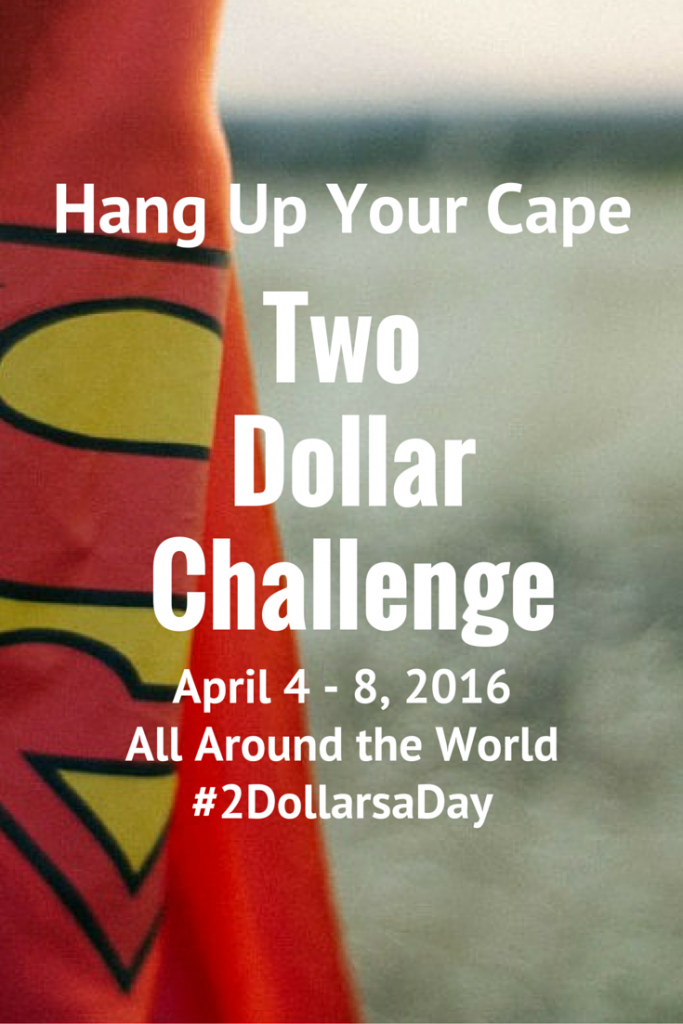Hang Up Your Cape
It may happen when a passerby with skeptical eyes asks you to explain your simulation of poverty. It may happen when you try to explain to the cashier that you can afford your groceries even though you have to put some items back. Or, it may happen while you are lying awake listening to the rain patter atop the tarp of your makeshift shelter.
Who knows when it will happen? But, it will. It happens to us all.
You are going to ask yourself:
“Is the Two Dollar Challenge appropriate?”
You may even want to scream:
“This is fraudulent!”
“I’m playing poverty!”
“This isn’t helping!”
It is. You are. It isn’t (well, at least not who you may have expected to help).
Those of us who participate in the Two Dollar Challenge are caught up in a fundamental tension between inquiry and insult. We want to know how to bring global poverty to an end. We want to know what we can do. We want to know where to begin. And, we think we can find answers by simulating another person’s material poverty. This is problematic (on a number of levels). But, it’s especially problematic, because in our quest to know these things, we may insult those whom we seek to “help”.
We wish that this was not the case. But, it is. And, we cannot escape this.
So, why don’t we just gather in a room and read books and articles and watch videos about poverty?
We could. And, we have. But, it only gets us so far. It’s one thing to learn about the multiple dimensions of material poverty by carefully following abstract lines of reasoning in a classroom. It’s another thing to begin this learning process with the assistance of experience.
But, here’s the thing:
We’re not trying to teach our participants how to end poverty.
We don’t know how to end poverty.
Yes, celebrity economists, billionaire philanthropists and the technocrati of Silicon Valley say we do.
But, we don’t.
Neither we nor they have had to end our own poverty.
So, how can we teach others how to end what we have never had to end ourselves?
We can’t. But, we can teach our participants how to end their hero-complex. And, to do that, we need their full attention.
We get their full attention by pulling them out of their context, taking them away from their accustomed community, and positioning them (albeit momentarily and incompletely) outside their dominant system of power and privilege. And, how do we do that?

We ask participants to go beyond the constraint of living on $2 per day. Among other rules, participants are asked to build makeshift shelters on campus, choose a spigot on campus as their one and only place to gain access to water, and boil their water before consuming it. Through these additional constraints (and others), we create the need for interdependence among participants. Building shelters, gaining reliable access to water, and being able to make bulk purchases at the grocery store requires cooperation. By creating the need for cooperation, we hasten the formation of community.
Community is the key.
With our community in place, we can gather together for honest and direct dialog. It is through dialog that we can:
- Begin to dismantle the Do-Gooder-Industrial-Complex and change our culture’s conversation about the end of poverty by reflecting upon and shifting the language we use to describe our role in its end.
- Challenge each other to go beyond common refrains such as “I’m so lucky to be born where I was born” and “I’m so grateful for the things I have.” Yes, we are lucky. But, poverty is not due to bad luck. Poverty is the result of a complex set of structures that we could change.
- Place the Two Dollar Challenge in the center of our circle and critique its incompleteness. For example, how we get to simulate poverty without having to confront the structural oppression that accompanies poverty or how we can choose to exit the simulation at a time of our choosing.
In our community, we can ask ourselves:
Can anything good come out of playing poverty?
And, although we may be hesitant at first to say it, we can answer “Yes.”
The Two Dollar Challenge is woefully imperfect. It is fundamentally flawed. But, it is through its imperfections that we get a glimpse of our privilege. And, it gives us a reason, a space and a place to gather and learn with and from one another.
And, what have we learned?
We have learned that simulated poverty is difficult enough. Real poverty – the kind of poverty that grinds away at you day in and day out, the kind of poverty that has no expiration date – is beyond our comprehension.
This humbles us.
We have learned that the struggle to end global poverty should also be focused on changing our behavior.
And, we have learned that in the story of poverty’s end we can only be SIDEKICKS.
We did not start at this place. Oh, no. We had to work to get here. We have to work every single day to stay in this place. But, if you want to end global poverty, we believe this a pretty good place to begin.
You will not end poverty by living on $2 a day.
But, you may just end our HERO-complex.
We believe that this is a good place to begin when you want to end global poverty. If you do too, then Sign Up for the 2016 Global Two Dollar Challenge!
Shawn Humphrey, the Blue Collar Professor (@blucollarprof), is founder of the Two Dollar Challenge
Connect with me on facebook: https://www.facebook.com/blucollarprof
Subscribe to my blog: http://feeds.feedburner.com/ShawnHumphrey

 Next Post
Next Post